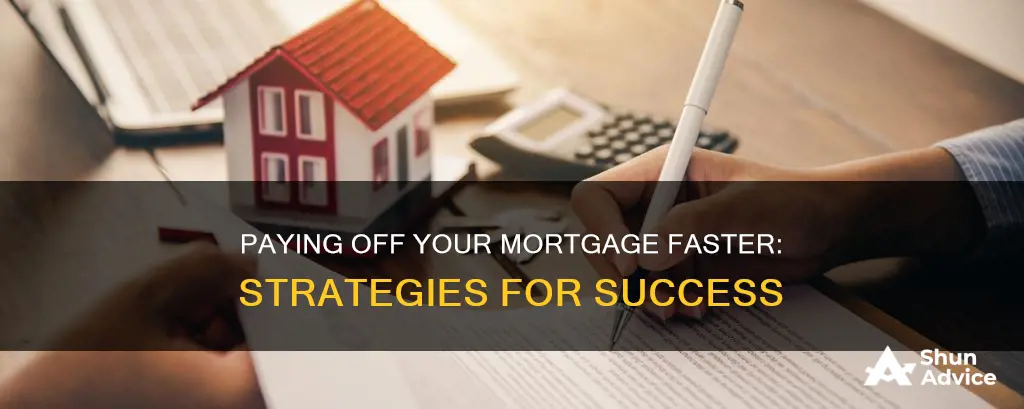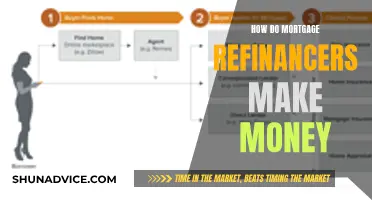
Paying off your mortgage faster is a great way to build wealth and financial stability. Not only will you be free from debt, but you'll also have extra money each month to save or invest. There are several strategies to pay off your mortgage faster, including making extra payments, refinancing to a lower interest rate or shorter term, and switching to biweekly payments. It's important to balance your financial priorities and consider any prepayment penalties before deciding to pay off your mortgage early.
What You'll Learn

Make extra payments
Making extra payments towards your principal balance on your mortgage loan can help you save money on interest and pay off your loan faster. Before you start making those extra payments, there are some things to consider. Firstly, check with your mortgage company as some companies only accept extra payments at specific times or may charge prepayment penalties. Prepayment penalties are fees that can be charged if your mortgage is paid off early. Many mortgage loans do not have prepayment penalties, but it is important to check with your lender. When making extra payments, include a note to indicate that you want the funds to be applied to the principal balance and not the following month's payment.
There are several ways to make extra payments. One strategy is to pay 1/12 extra each month. For example, by paying $975 each month on a $900 mortgage payment, you will have paid the equivalent of an extra payment by the end of the year. Another strategy is to round up your payments to the next highest $100 amount. For instance, pay $800 instead of $743, or $900 instead of $860. This dollar-a-month strategy should be financially feasible if your income increases slightly but consistently over time. Each month, increase your payment by $1. Simply pay $900 the first month, $901 the second month, and so on.
If you cannot afford to make larger or more frequent payments, you could still chip away at your principal balance with one-off lump-sum contributions. Commit to putting any work bonuses, tax refunds, inheritance, or other windfalls towards your mortgage principal. Additionally, you could increase your payments when you get a raise or bonus. That little bit extra will save you from paying more interest than you have to.
Generate Mortgage Leads: Strategies for Success
You may want to see also

Refinance to a lower interest rate
One of the most common reasons for refinancing a mortgage is to secure a lower interest rate. This can help you lower your monthly payments and save money over the loan term. When interest rates fall, refinancing an existing loan for another loan with a lower interest rate can help you save a significant amount of interest over time. For example, a $100,000, 30-year fixed-rate mortgage with an interest rate of 7% has a principal and interest payment of $665. That same loan at 5% reduces your payment to $536.
To find a lower interest rate, it is important to shop around and compare rates from multiple lenders. Bankrate's mortgage refinance rate table, for instance, allows you to compare personalized rates from trusted lenders. When evaluating lenders, consider not only the interest rate but also the annual percentage rate (APR), which includes the interest rate and other costs such as the origination fee and any points.
In addition to comparing rates, there are other factors to consider when deciding whether to refinance to a lower interest rate. Firstly, determine whether you will end up saving money by refinancing. The rule of thumb has been that refinancing is worth it if you can reduce your interest rate by at least 2%, but some lenders say that even a 1% savings is enough of an incentive. Secondly, consider the length of time you intend to occupy the property. Refinancing costs can amount to between 5% and 7% of a loan's principal, so it's important to determine whether the long-term benefits outweigh these short-term costs. Lastly, if you are considering refinancing, keep in mind that lenders will require documentation about your current mortgage, income, assets, and debt to provide the most accurate refinance quote.
Making Mortgage Payments: Wells Fargo Guide
You may want to see also

Downsize to a smaller home
Downsizing to a smaller home is a great way to pay off your mortgage faster. It can be an emotional experience, but it is a practical step that can improve your life, especially your finances. Moving to a smaller home means lower mortgage payments, and you may even be able to pay for your new home outright with the profits from the sale of your current home.
Before you decide to downsize, it is important to consider the hidden costs. For example, you may need to make repairs to your current home to get it market-ready, and there will be moving costs to consider. You may also need to buy new, space-efficient furniture and appliances. Additionally, you will need to consider the cost of property taxes, storage, and HOA fees.
If you decide to go ahead with downsizing, the first step is to hire a real estate agent to help you sell your current home and buy a new one. You will also need to get organized and start decluttering. Take photos of items you want to sell, and donate any unwanted items to charity. Keep a "must-keep" list to help you plan how large your new home needs to be.
When you buy a smaller home, you may need to refinance or take out a new mortgage. If you can, put down at least 20% to avoid paying private mortgage insurance (PMI). You could also consider a 15-year fixed-rate mortgage to help you pay off your home faster.
By downsizing to a smaller home, you will reduce your monthly mortgage payments and have extra cash each month to put towards other financial goals, such as saving for retirement or paying off other debts.
Transferring Your Mortgage: Navigating Away from Selene
You may want to see also

Round up your payments
One strategy to pay off your mortgage faster is to round up your payments. This strategy is relatively simple and can lead to significant savings. The basic idea is to round up your mortgage payment to the next whole-dollar increment, which can be $1, $5, $10, $25, $50, or $100. For example, if your monthly home loan payment is $1,501, you could bump it up to $1,600. This would lead to considerable savings, especially on the interest of your loan.
Let's consider an example where you have a $200,000 loan amount with a 4% interest rate and a loan term of 30 years (360 months). The minimum Principal & Interest payment for this mortgage is $954.83, and it will take you the full 360 months or 30 years to pay it off. By rounding up your payments to $1,000, you are paying $45.17 more towards the principal amount. This reduces your term by 29 months or roughly 2.4 years.
The savings from rounding up your payments will depend on various factors, such as the loan amount, interest rate, and the size of the rounded-up payment. For instance, if you have a $500,000 loan with a 4.5% interest rate and a monthly payment of $2,533.43, rounding up to $2,600 will lead to savings of nearly $25,000 in interest over the loan term. However, it is important to note that the term is not reduced as significantly because the rounded-up payment is smaller relative to the larger payment.
Rounding up your mortgage payments requires discipline to stick to the plan each month. It may not be the best method for those with specific goals, such as paying off the mortgage before retirement. Additionally, if you have other high-interest debts or expenses, it is important to consider your financial situation before deciding to pay more towards your mortgage.
Making Mortgage Overpayments: A Guide to Getting Started
You may want to see also

Budget and save
Budgeting and saving are key to paying off your mortgage faster. Here are some strategies to consider:
Budgeting
- Refinance your mortgage: If mortgage rates have dropped since you initially took out your loan, you may be able to refinance to a lower interest rate, which will reduce your monthly payments. You could also refinance to a shorter term, which will increase your monthly payments but cut down the overall repayment timeline. While refinancing comes with closing costs, the long-term savings may outweigh these fees.
- Switch to biweekly payments: By paying half of your monthly mortgage payment every two weeks, you will make the equivalent of 13 full payments per year instead of 12, thus reducing your principal faster.
- Make extra payments: If you can afford to, consider making extra payments on the principal balance of your mortgage. This will help you pay off your mortgage faster and save money on interest. However, be aware of potential prepayment penalties, which some lenders may charge if your mortgage is paid off early.
- Increase your monthly payments: Even if you don't want to commit to a shorter-term mortgage or biweekly payments, you can still benefit from increasing your monthly payments by a dollar amount that you can afford. This could be a fixed amount, such as $100, or a percentage of your income.
- Use windfalls: If you receive any unexpected windfalls, such as bonuses, tax returns, or gifts, consider putting this money towards your mortgage.
Saving
- Build an emergency fund: Before focusing all your efforts on paying off your mortgage, it's important to have an emergency fund in place to cover unexpected expenses. Aim to save enough to cover 3-6 months' worth of typical expenses.
- Pay off other debts: It's a good idea to prioritize paying off high-interest debts, such as credit cards or student loans, before focusing on your mortgage. This will free up more of your income to put towards your mortgage in the future.
- Save for retirement: While paying off your mortgage can be a great financial goal, it's also important to balance this with saving for retirement. Consider increasing your retirement contributions if you can afford to do so.
- Downsize your home: If you're willing to consider a smaller, less expensive home, selling your current home and buying a new one could reduce your debt and lower your monthly payments.
Remember, it's important to consider your full financial picture and ensure that you're balancing your various financial priorities and goals when creating a budget and saving plan to pay off your mortgage faster.
A Guide to Understanding and Applying for a Mortgage
You may want to see also
Frequently asked questions
You can pay off your mortgage faster by making extra payments toward your principal balance. This will help you save money on interest and pay off your loan faster. You can also switch to biweekly payments, which means paying half of your mortgage payment every two weeks instead of a lump sum once a month. This will result in 13 full payments a year, equivalent to an extra month's payment.
If mortgage rates have dropped since you initially got your loan, you can refinance to pay less interest. You can also refinance to a shorter term, which will cut down the repayment timeline. For example, if you've paid off about 10 years on a 30-year mortgage, you could refinance to a 15-year mortgage to get you closer to the end date.
You can put all your extra income, such as bonuses, raises, and gifts, toward your home loan. You can also sell your larger home and use the profits to buy a smaller, less expensive house. With the profits from the sale, you may be able to pay off your new mortgage faster or even pay 100% in cash.







